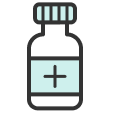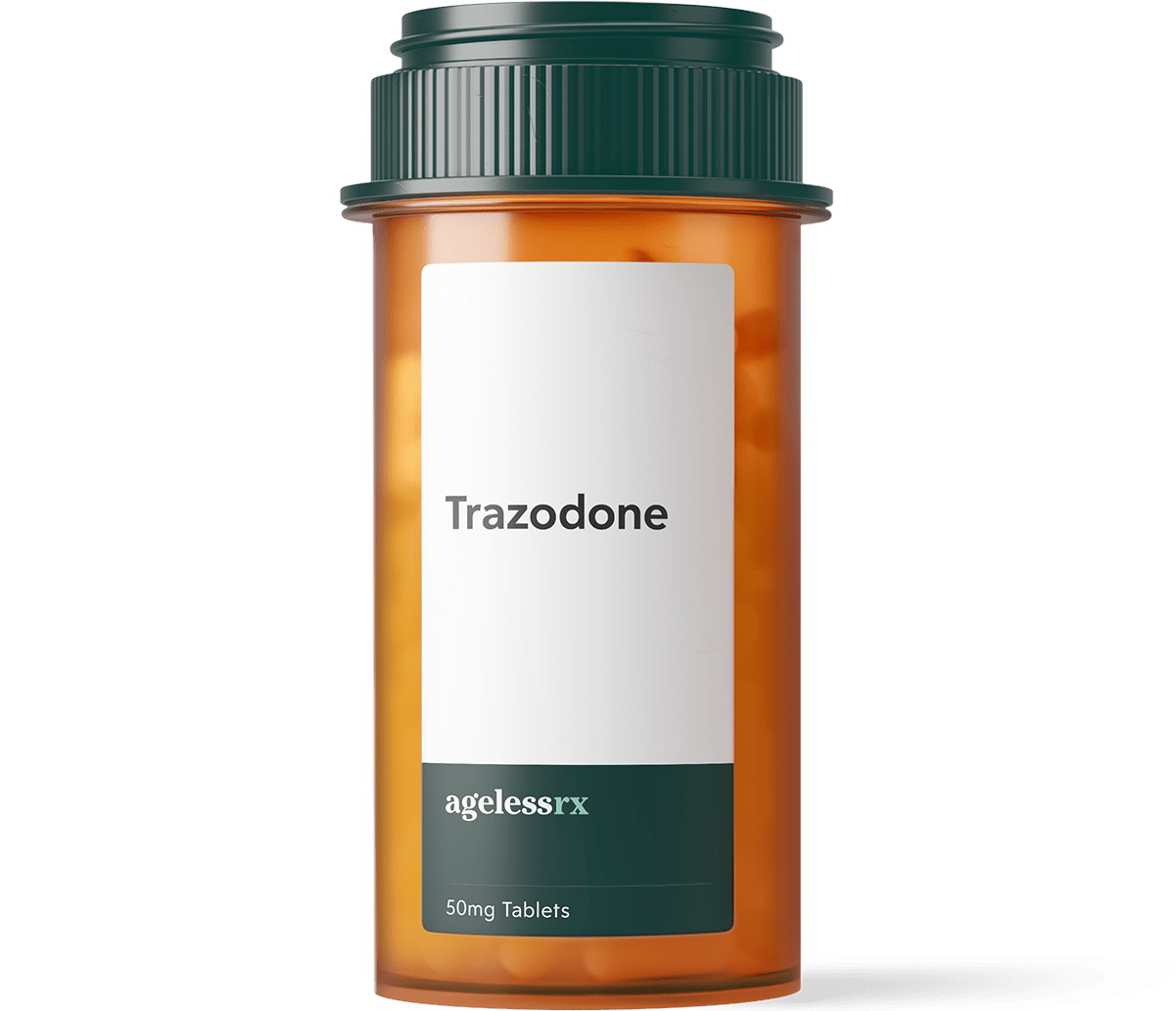Trazodone benefits

Encourages natural, restful sleep
Studies show low doses can result in lower serotonin, histamine, and noradrenaline, helping users fall asleep faster and stay asleep longer.

Restores healthy sleep patterns
Trazodone’s unique action enhances non-REM cycles and can cause a boost to sleep architecture.

Improves mood & cognitive well-being
Studies show that Trazodone may lift mood, reduce anxiety, and support mental clarity.

Non-habit forming
Studies show that Trazodone is non-addictive and quickly metabolized, reducing next-day grogginess.
Why sleep matters for your longevity

Short-term biological impacts of sleep
Hormonal balance
Sleep regulates hormones like cortisol and insulin, essential for stress management and metabolic health.
Enhanced immune function
Quality sleep strengthens the immune response, enabling the body to fend off illnesses more effectively.
Long-term impacts of sleep
Cellular repair and regeneration
Sleep promotes the production of growth hormones crucial for tissue growth and muscle repair, counteracting multiple aging hallmarks alongside inflammation.
Telomere preservation
Quality sleep is linked to longer telomeres, the protective caps on chromosomes that typically shorten with age, reducing the risk of age-related diseases.
Metabolic health
Lessen the disruption to metabolic pathways that lead to insulin resistance and increased risk of conditions like type 2 diabetes and cardiovascular diseases.
Get started
What to expect

1 Day
After first dose, may experience calming effect, helping to reduce anxiety and racing thoughts.1

1 Week
Users report more relaxation, falling asleep faster, and longer uninterrupted periods of sleep by one week.2

1 Month
Users report experiencing an improvement in sleep quality and efficiency, resulting in more restorative sleep.3

3 Months
With consistent sleep, users may notice improved stress management and memory with better sleep architecture.5

6 Months
Users report increased deep non-REM sleep, shown to accelerate cellular repair with less daytime brain fog.4

1 Year+
Prioritizing consistent sleep can lower risks of age-related diseases and extend your healthspan by up to 15%!6
FAQs
Who can safely take Trazodone?
Trazodone can be taken by generally healthy adults who are at least 25 years old.
How long does Trazodone take to work?
Studies show that Trazodone’s sleep-inducing effects are strongest 30-60 minutes before you plan to go to bed at night. Clinical trials suggest that benefits like better sleep, improved memory recall, and enhanced concentration have been reported within 4 weeks. All patients react uniquely to Trazodone, and results may vary. If you feel you’re not meeting your health goals on your prescribed dose, contact your prescriber to see if changing your target dose is right for you.
Will Trazodone make me groggy?
Trazodone has a lower risk of side effects than most FDA-approved sleep aids, including a lower risk for next-day grogginess or daytime drowsiness. This may be because Trazodone also has a shorter half-life, is metabolized more rapidly, or cleared quickly for the bloodstream.
However, drowsiness is still one of the most common side effects of Trazodone. You may experience initial daytime drowsiness once you first start taking Trazodone, which is why you should avoid driving until you understand how Trazodone will affect you. Drowsiness may come back briefly if you increase your dose, so plan ahead.
The good news is that Trazodone side effects are dose-dependent. That means side effects like grogginess can be an indication that your current dose is too much for you. If you find that your grogginess doesn’t get better after a week or two, you may still be able to cut down your dose by 25mg so you can continue to enjoy better, longer sleep with Trazodone. Always talk with your prescriber before adjusting your dose.
See all FAQsImportant safety information and common side effects
Most common side effects
Trazodone has the following common side effects: constipation, diarrhea, nausea, xerostomia (dry mouth), back aches, headaches, confusion, dizziness, insomnia, somnolence (drowsiness), blurred vision, nervousness, fatigue, vivid dreams, or nightmares. These side effects often lessen and resolve within the first few weeks of use, as the body adjusts to the medication. Side effects are dose dependent and may reoccur as you increase your dosage according to your doctor-prescribed titration plan.
Patients taking Trazodone should avoid driving or other activities requiring mental acuity or coordination until they are sure side effects such as confusion, dizziness, or drowsiness will not affect them.
Other important safety information
Trazodone may cause the following rare but serious side effects: cardiac dysrhythmia, hypotension (low blood pressure), prolonged QT interval, torsades de pointes, hypersensitivity reaction, priapism (prolonged erection), or seizure. If you have a personal or family history of any of these, your AgelessRx prescriber may recommend an alternative solution.
Trazodone has a black box warning for suicidal thoughts or ideation. This risk increases in children or young adults and is higher within the first few months of treatment. AgelessRx does not prescribe Trazodone to anyone under the age of 25, but all patients should watch for new or sudden changes in mood, behaviors, thoughts, or feelings. If you experience thoughts of suicide or worsening depression, stop using Trazodone immediately and contact your doctor or a qualified mental health professional. For mental health emergencies, dial or text 988 to speak with a trained health counselor 24/7.
Tell your healthcare provider about all the medicines you take, including prescription and over-the-counter medicines, vitamins, and herbal supplements. Trazodone may affect the way some medicines work, and some medicines may affect the way Trazodone works. Tell your healthcare provider if you are taking any medications to treat depression or insomnia, including Prozac (fluoxetine) or Ambien (zolpidem).
Do not take Trazodone if you are currently prescribed a monoamine oxidase inhibitor (MAOI). Do not use Trazodone within 14 days of discontinuing an MAOI. MAOIs include saquinavir/ritonavir, colchicine, isocarboxazid, linezolid, methylene blue injection, phenelzine, pimozide, safinamide, saquinavir, selegiline transdermal, thioridazine, and tranylcypromine.
Some patients may be advised to discontinue Trazodone at least 24 hours before surgery or diagnostic procedures, depending on the particular procedure. If you’re not sure whether you need to stop Trazodone for a particular procedure, speak with the doctor who ordered the procedure. Do not resume taking Trazodone until your doctor advises you that it is safe.
Do not take Trazodone if you are pregnant or breastfeeding, or plan to become pregnant or breastfeed while taking Trazodone.
Do not take Trazodone if you are allergic to Trazodone or any of its ingredients.
Eligibility and approval for treatment is always at the discretion of your prescriber based on an assessment of your complete health profile. Approval is not guaranteed.
Note: This product alone is not intended to diagnose, treat, cure, or prevent any disease. Please consult a medical professional to determine whether or not Trazodone is appropriate for you.
1https://pmc.ncbi.nlm.nih.gov/articles/PMC5842888/
2https://pmc.ncbi.nlm.nih.gov/articles/PMC3165092/
3https://www.nature.com/articles/s41598-022-18776-7
4https://www.nih.gov/news-events/news-releases/nih-funded-study-shows-sound-sleep-supports-immune-function
5https://www.sleepfoundation.org/physical-activity/athletic-performance-and-sleep
6https://www.ncbi.nlm.nih.gov/books/NBK19961/


